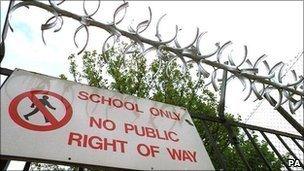'Ban faith-based school selection' demands new campaign
- Published

All state-funded schools should be open to all children, regardless of religion, demands a new campaign.
The Fair Admissions Campaign wants to ban state schools in England and Wales from selecting pupils on faith grounds.
The new group says religion-based admission policies can fuel segregation and cause "distrust and disharmony".
A spokeswoman for the Catholic Education Service rejected "the unfounded claim that Catholic schools are socially divisive".
The group which includes the British Humanist Association (BHA), the Accord Coalition and the Centre for Studies on Inclusive Education warns that a faith-based admissions system can have a damaging effect on communities.
No other public service, such as hospitals, would be allowed to restrict access on religious grounds, say the campaigners, who argue that faith-based selection is "fundamentally wrong".
'Incredibly unfair'
They add that allowing children to grow up with friends from a range of religious backgrounds teaches pupils to understand each other.
"This campaign is important because it is incredibly unfair that children are unable to get into a local school because their parents are not of the right religion or have no religion," said Pavan Dhaliwal of the BHA.
"This causes divisions in society. In a healthy society children should be able to interact with each other regardless of their background.
"Segregation, racial or religious, causes distrust and disharmony."
Under the current system faith schools that are over-subscribed can select pupils based on their religion.
The new campaign states that a "substantial majority" of faith schools prioritise pupils on grounds of faith. They claim there is evidence that religious segregation can lead to social segregation as some parents find it easier than others to attend church regularly.
They add that their own research suggests that children eligible for free school meals, a key measure of poverty, are likely to be concentrated in non-faith schools.
They suggest that non-religious secondary schools have 30% more pupils on free school meals than average, while Roman Catholic Schools have 23% fewer and Church of England schools 18% fewer.
Ted Cantle of the Institute of Community Cohesion said: "Our communities remain riven by the differences which we should be learning to set aside.
"Religiously selective schools cannot of course be held solely responsible for these problems, but they do underpin a system in which children learn that they are 'different' and in which everyday contact is denied."
'Parental choice'
Rabbi Jonathan Romain, chairman of the Accord Coalition, said: "Whether you are religious or secular, a key value is fairness."
He added that faith-based admission risked teaching children "a terrible lesson about us and them and at the very age when we should be promoting inclusivity and equality. It is the wrong message and at precisely the wrong time."
The Catholic Education Service said government statistics showed pupils at Catholic Schools were both more ethnically mixed than average and more likely to be from the poorest areas than those at other schools.
A spokeswoman said: "This patchwork quilt of community schools and schools with a religious ethos places parental choice at the heart of the education system."
A Church of England spokeswoman said: "Church of England schools serve the local community and have done for more than 200 years being the first provider of free education for all.
"They are hugely popular with parents which means they are often over-subscribed and take pupils of all faiths and none providing a high quality, effective and inclusive education with a distinctive Christian ethos."
A government spokeswoman said: "Schools must abide by the admissions code and no school can refuse children if there are places available.
"New academies and free schools with a faith designation which are oversubscribed must allocate at least half of places to children without reference to faith."
- Published30 March 2012
- Published18 November 2011
- Published27 August 2010
- Published4 December 2008